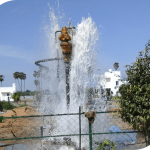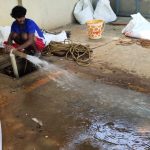The Top 4 Causes of Bore Pump Failure and How You Can Avoid Them
Introduction
A carefully chosen bore pump will be effective and productive for a very long period. Numerous pumping challenges are eliminated by the submerged system architecture and flooded suction of a bore pump. However, failing to keep track of the pump output over time will make it more difficult to spot changes, which could need an expensive borewell pump system repair in Chennai.
Since not all pumps are created equal, it is essential to understand how your pumping system is constructed if you want to keep it from breaking down. The lifespan of your pump can still be impacted by a few common factors, provided you choose the proper pump. Here, we examine the most frequent causes of pump failure and suggest ways to reduce the likelihood that they may occur.
Samy Borewell is a well-known business in Chennai that offers borewell plumbing services for your needs.
Motor failure
Motor failure is the most frequent reason for pump failure. This happens when the motor overheats, most frequently due to insufficient cooling from the water passing the motor’s outside.For a pump output delivery to be balanced and sustainable, it must match the groundwater intake. The motor will overheat and stop working if the required minimum velocity level for adequate cooling (0.15 m/s) is not reached. Reduced groundwater inflow may be the cause of your unit constantly starting and stopping if you have low-level flow protection. It is recommended to look into utilizing a borewell contractor in Chennai to avert a motor failure.
Iron contamination
Borehole pumps are mostly harmed by iron oxidation and iron bacteria, among other things.When these impurities build up, they start to block and corrode the pump components and can eventually cause the entire system to fail. Iron contamination is most likely present in your pump system if you notice threads or sludge with a reddish hue. Iron bacteria can be effectively eliminated by cleaning and sanitizing the system, and utilizing a liquid solution can assist flush out any accumulations of iron deposits. Additionally, these contaminants can be captured and limited with the use of an in-line filter employing borewell compressor cleaning in Chennai.
Level of water
Given that a submersible pump is intended to be submerged in water by definition, one could assume that there are no restrictions on how deep you can draw water from a bore. But there comes a point where the efficiency suffers and the pump suffers physical harm. If you restill unsure, check with the staff at MTP so that we can guide you. Your pump will come with its NPSH-required drawdown limit. Low water levels may cause your pump to often start and stop, which could shorten its lifespan and cause damage. It is essential for preventing motor failure to know the maximum number of times your pump should be started each day based on its motor diameter. Monitoring the incoming power supply is another thing that can be done to aid, as a lower voltage supply causes a larger amperage demand, which in turn causes a higher working temperature by employing the best borewell cleaning in Chennai.
Conclusion
A well-chosen pump will normally provide many years of reliable operation, but should the application change, the pumping situation will almost probably change as well. The pump can attempt to work in a less-than-optimal manner as a result, which could lead to reduced flow, pressure variations, and frequent total failure. Changes like these sometimes go undiscovered until serious deterioration has begun if a bore pump operator is not utilizing a
pressure gauge. If you want to know if your pump’s application has changed, setting up a pressure gauge might be quite helpful. When using borewell cleaning services in Chennai, being able to keep an eye on your bore pump’s power supply, flow, and other operational components can be very helpful in diagnosing any issues that arise.





